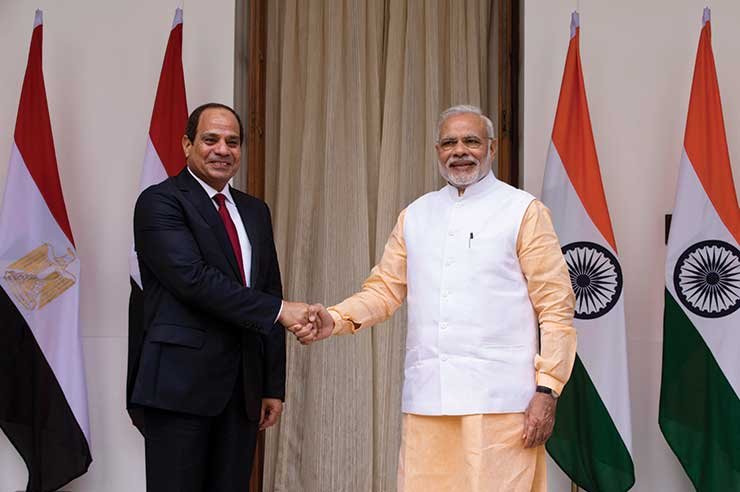
Defence Minister Rajnath Singh signed an MoU on defence cooperation with Egypt during his first visit to Egypt on September 21, 2022. During the visit, the minister held wide-ranging discussions with Egyptian Defence Minister General Mohamed Zaki, and a call-on with the Egyptian president Fateh Al Sisi. The two sides discussed avenues for deeper cooperation, including the fight against terrorism, maritime security and the purchase & co-production of military platforms. Egypt is one of the many countries that has evinced interest in purchasing Light Combat Aircraft (LCA) ‘Tejas’.
This visit comes at a time when both India and Egypt value each other as partners, and seek deeper engagement. 2022 is of particular significance since it marks the 75th anniversary of diplomatic relations between India and Egypt, as both countries had established formal diplomatic relations on 18th August 1947.
India-Egypt Relations: A Background
India and Egypt are two of the world’s ancient civilizations with a history of close contact. Numerous historians have recorded the common heritage of the ancient civilizations of these two countries. Some historians have attempted to conclude that the Dravidians from India laid the foundations of Egyptian civilization. Egyptians also believe in the traditional discourse that they originally came from the South, from a land called Punt, which a historian, Dr H.R. Hall, thought referred to some part of India. Adolf Erman (1854-1937), author of the book “Life in ancient Egypt”.
There is also a clear mention of good relations with Egypt in Emperor Ashoka’s edicts. In Ashoka’s thirteenth rock edict, inscribed in the early decades of the third century B. C, Ashoka mentions his contacts with Ptolemy II Philadelphus of Egypt (285-246 BC). In modern history, the freedom movement of both countries had common threads wherein Mahatma Gandhi and Saad Zaghloul shared similar goals towards gaining independence.
The formation of the Non-Aligned Movement (NAM) was a clear manifestation of not only very close relations between Prime Minister Jawaharlal Nehru and Egyptian President Gamal Abdel Nasser but also a common vision of global order.

India-Egypt relations could not, however, maintain the positive momentum in the coming decades, especially after Anwar Sadat became the President. With Sadat choosing to align with the US and India ideologically aligned with the USSR during the cold war period, the relations remained low-key.
Ties remained stagnant until a breakthrough in November 2008, when President Hosni Mubarak visited India. Bilateral ties had stalled due to mutual neglect, and it was time to change that. Both sides decided to establish a Strategic and Security Policy Dialogue at the level of foreign ministers.
Importance of Egypt
Straddling three continents; Asia, Africa and Europe (across the Mediterranean Sea), Egypt is a pillar of the Arab world and a key regional leader of the African continent. The Suez Canal, connecting the Mediterranean Sea and the Red Sea, offers the shortest sea link between the East and the West. As the largest Arab nation with a population of over 80 million, Egypt has traditionally played a central role in regional politics for decades.
Egypt plays a pivotal role in managing relations with Iran and Turkey and combating sea piracy across the Red Sea and the Mediterranean. Egypt also possesses one of the largest and most well-equipped armed forces in the region and has the 10th largest army in the world. Egypt’s importance to the area is therefore undeniable. As a result, there is a strong connection between the various developments within Egypt and the region.
Recently, especially after the ‘Arab Spring’, Egypt’s relations with global powers have undergone significant realignments. Egypt-U.S. relations are no longer on the same pedestal as in the Mubarak era. Conversely, Egypt’s relations with Russia and China are improving, as evidenced by a purchase deal of 46 Attack Helicopters from Russia, and the signing of a comprehensive strategic partnership agreement with China.
Egypt-Saudi Arabia relations are also on the upswing. Both countries have signed an agreement to set up a 60 billion Saudi riyal investment fund in Egypt, including an economic free zone to develop Egypt’s Sinai region. Saudi Arabia also announced the construction of a bridge across the Red Sea to link Egypt, while Egypt transferred sovereignty of its two islands, Tiran and Sanafir, to Saudi Arabia.

India and Egypt: Possibilities of a Deeper Engagement
India’s interests in Egypt go well beyond historical relations. Egypt, with its history of pan-Arab leadership, and being the most populous nation in Africa, is critically important to India. India clearly recognizes the status that Egypt enjoys in the West Asian region. Stability in Egypt is a key to stability in the region. As India seeks to expand its economic and strategic interests in the Gulf region and Africa and further strengthen its ‘Look West’ policy, peace and stability in the area are critical. Egypt forms a key vector in this equation.
Both President Sisi and PM Modi came to power in May 2014. Since then, there has been a concerted effort to revitalise the relationship. Several bilateral visits have fructified as a result. In August 2015, the visit of former External Affairs Minister, the Late Sushma Swaraj to Egypt, resulted in the two sides scaling up security and counter-terror cooperation. President Sisi visited India in 2016, a significant step in the two countries coming closer.
Additionally, President Sisi has had meetings with PM Modi more than thrice in the recent past. Egypt also collaborated closely with India during the Covid pandemic and is now eagerly seeking India’s help in meeting its requirements for wheat imports, which were affected by the war in Ukraine.
On the defence and security front too, engagements have intensified since 2015. These include the visit of the Minister of Defence of Egypt, General Sedki Sobhi, in 2017 and the visit of our Defence Minister, Nirmala Sitharaman, in 2018. In February 2021, the Commander-in-Chief of Egyptian Armed Forces, Minister of Defence & Military Production, General Mohamed Ahmed Zaki, participated virtually in the Indian Ocean Region (IOR) Defence Ministers Conclave at Bengaluru.
India’s Chief of Air Staff, Air Chief Marshal VR Chaudhari, visited Egypt in November-December 2021. The first ever IAF-EAF Joint Tactical Air Exercise, Dessert Warrior, was held from October 29-31, 2021. The signing of an MoU on defence cooperation and the possible sale of LCA ‘Tejas’ is likely to give a fillip to the ties.
Trade ties are also an important part of the engagement. Egypt has traditionally been one of India’s most important trading partners in the African continent. The India-Egypt Bilateral Trade Agreement signed in March 1978, is based on the Most Favoured Nation clause. Bilateral trade expanded in 2021-22, amounting to 7.26 billion, registering a 75% increase compared to FY 2020-21. India’s exports to Egypt during this period amounted to US$ 3.74 billion, registering a 65% increase over the same period in FY 2020-21. According to the Egyptian Central Agency for Public Mobilization and Statistics (CAPMAS), India was the 3rd largest export market for Egypt, 6th largest trading partner and 7th largest exporter to Egypt. The Suez Canal and the Gulf of Aden are key routes of trade for India. About 20-24 Indian flagged merchant ships transit the Gulf of Aden every month.
Threatened with a shortage of wheat due Russia-Ukraine conflict, the Egyptian Cabinet on 14th April 2022, announced the inclusion of India in the list of accredited countries which can supply wheat to Egypt, thus ending a long pending Non-Tariff Barrier. Promptly, India cleared an initial shipment of 61,500 metric tons of wheat for Egypt on May 17, 2022.
Space cooperation is an emerging area of cooperation, and an MoU was signed in 2008. Egypt established EgSA (Egyptian Space Agency) in 2019 and seeks greater cooperation with ISRO. Culture is another close bond between the two countries. The Maulana Azad Centre for Indian Culture (MACIC) was set up in Cairo in 1992 to promote cultural cooperation. ‘Sawt-ul-Hind’, flagship Arabic magazine published by Indian Embassy, reached a milestone in July 2017 by publishing its 500th edition, depicting the strong bond and vibrant cultural exchanges between the two countries.
Yoga has gained immense popularity in Egypt. To mark the 150th Birth Anniversary of Mahatma Gandhi, a commemorative stamp on Mahatma Gandhi was released by Egypt Post on 6th November 2019. Shri Hardeep Singh Puri, Minister of State (IC) for Civil Aviation, unveiled a bronze bust at Al-Horreya Park in Zamalek on the same day. Egypt has named a street in Cairo after Mahatma Gandhi.
India has the world’s third-largest Muslim population and the world’s largest Muslim population in terms of a minority population. Of the Muslims in India, the Sunni sect forms the majority. Among other Muslim voices from the West Asian region, Egypt’s Al Azhar University and Mosque influence the Muslims of India, another important factor in bilateral relations.
Egypt and India are, therefore, important to each other. Both are looking at avenues of deeper cooperation and convergence at multiple levels of engagement. With Egypt being the ‘Gateway to Africa’ for India and a crucial partner in seeking strategic convergence with stakeholders in the region, the time is now ripe for the two countries to take this relationship forward, seeking greater strategic convergence.
-The writer is an army veteran, a research scholar and analyst on international relations and Assistant Director at MP-IDSA New Delhi. The views expressed are of the writer and do not necessarily reflect the views of Raksha Anirveda
The writer is a Senior Research Consultant at Chintan Research Foundation, New Delhi. His X Handle is @rajeev1421. The views expressed are personal and do not necessarily carry the views of Raksha Anirveda






